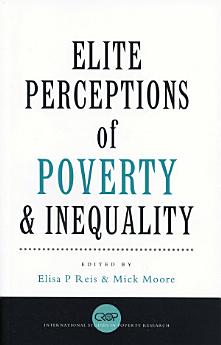Elite Perceptions of Poverty and Inequality
Elisa Reis · Mick Moore
fbl 2008 · Bloomsbury Publishing
E-book
229
Pages
reportLes notes et avis ne sont pas vérifiés. En savoir plus
À propos de cet e-book
The researchers who have written this volume are clear not only that mass poverty is still the leading humanitarian crisis in developing countries, but that, if effective policies are to be put in place, the national elites who control governments and economies need to be convinced of both the reasons why reducing poverty is in their own and the national interest, and that public action can make a difference. Remarkably, in the rapidly growing literature on poverty, this volume is the first to use survey techniques to explore Third World elites' attitudes to poverty.
Five cases - intended to be broadly representative of the diversity of situations in developing countries - were chosen: Brazil, South Africa, the Philippines, Bangladesh and Haiti. While the authors found major differences in how national elites understand and represent poverty, the classic threats that induced elites in late 19th Century Europe to be concerned with reducing poverty - the fear of crime, epidemics, military weakness or political unrest - do not feature prominently in the consciousness of most Third World elites. Nor do most of them believe that there is a viable solution to poverty through public action.
The findings in this book throw light on one reason for the relative ineffectiveness of poverty reduction strategies hitherto, and the huge importance of presenting the problem of poverty in ways that fit more closely with the ways in which national elites understand their world.
Five cases - intended to be broadly representative of the diversity of situations in developing countries - were chosen: Brazil, South Africa, the Philippines, Bangladesh and Haiti. While the authors found major differences in how national elites understand and represent poverty, the classic threats that induced elites in late 19th Century Europe to be concerned with reducing poverty - the fear of crime, epidemics, military weakness or political unrest - do not feature prominently in the consciousness of most Third World elites. Nor do most of them believe that there is a viable solution to poverty through public action.
The findings in this book throw light on one reason for the relative ineffectiveness of poverty reduction strategies hitherto, and the huge importance of presenting the problem of poverty in ways that fit more closely with the ways in which national elites understand their world.
À propos de l'auteur
Elisa P. Reis is professor of political sociology at the Federal University of Rio de Janeiro, chair of the Brazilian Interdisciplinary Research Network on Inequality (NIED) and current president of the Research Committee on Sociological Theory of the International Sociological Association.
Mick Moore is currently professorial fellow at the Institute of Development Studies, University of Sussex; and director of the Centre for the Future State.
Mick Moore is currently professorial fellow at the Institute of Development Studies, University of Sussex; and director of the Centre for the Future State.
Donner une note à cet e-book
Dites-nous ce que vous en pensez.
Informations sur la lecture
Smartphones et tablettes
Installez l'application Google Play Livres pour Android et iPad ou iPhone. Elle se synchronise automatiquement avec votre compte et vous permet de lire des livres en ligne ou hors connexion, où que vous soyez.
Ordinateurs portables et de bureau
Vous pouvez écouter les livres audio achetés sur Google Play à l'aide du navigateur Web de votre ordinateur.
Liseuses et autres appareils
Pour lire sur des appareils e-Ink, comme les liseuses Kobo, vous devez télécharger un fichier et le transférer sur l'appareil en question. Suivez les instructions détaillées du Centre d'aide pour transférer les fichiers sur les liseuses compatibles.





